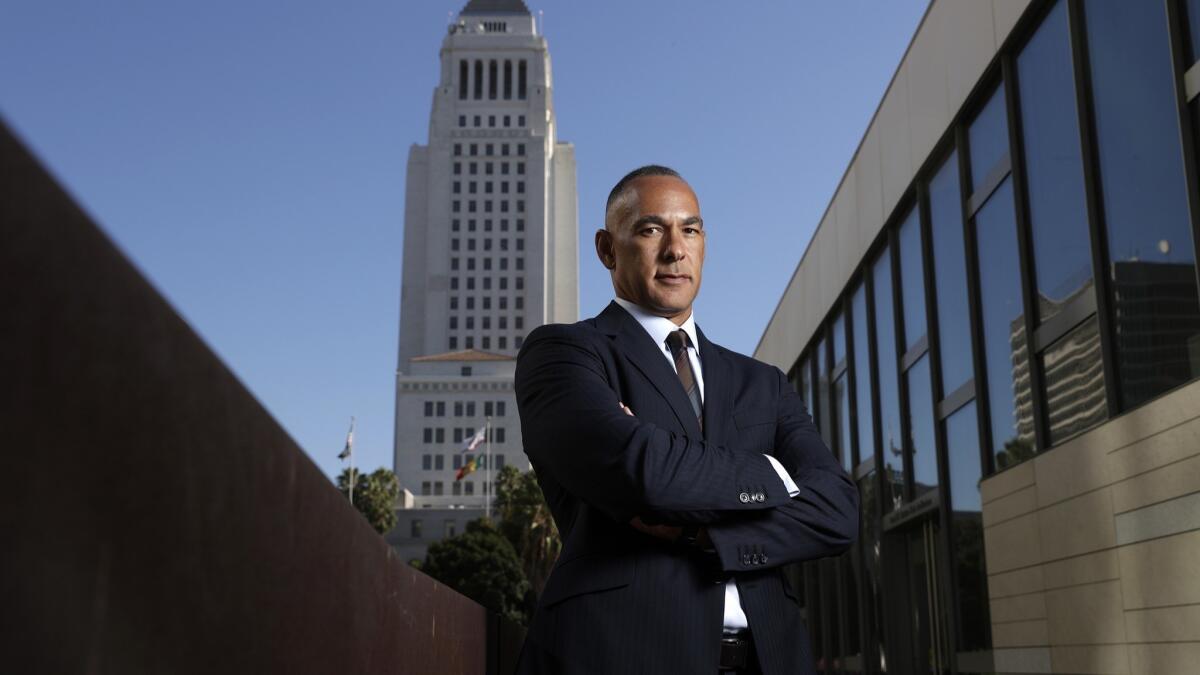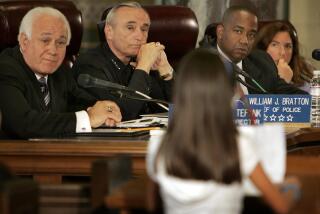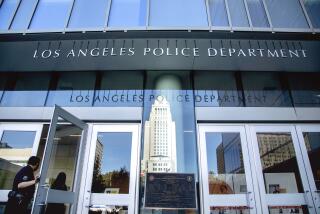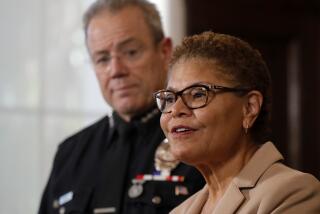Police Commissioner Matt Johnson, who spearheaded key LAPD reforms, to step down

As a new member of the civilian board that oversees the Los Angeles Police Department, Matt Johnson wanted to reduce the number of police shootings.
The fatal shooting of Michael Brown by a police officer in Ferguson, Mo., in August 2014 had recently shaken the country, giving rise to the Black Lives Matter movement and placing unprecedented public scrutiny on law enforcement.
Los Angeles, too, had seen its share of controversial shootings of unarmed black men, including Ezell Ford in South L.A. and Brendon Glenn in Venice.
What followed his 2015 appointment were three tumultuous years in which Johnson, who is African American, spearheaded key reforms while drawing the ire of many local Black Lives Matter activists who faulted him for working within the system instead of tearing it down. At Police Commission meetings, some called him a “house negro,” while others sought to confront him at his home and office.
Using a methodical, collaborative style perfected as an entertainment lawyer striking deals for Oprah Winfrey, Serena Williams and the Obamas, Johnson persuaded the police union and top LAPD officials to support his agenda.
On Wednesday, Johnson will announce his departure from the Police Commission, leaving an LAPD that he argues is more transparent, better trained and better equipped, with a de-escalation policy intended to prevent deadly shootings.
All patrol officers are now armed with Tasers, which they can use to subdue a suspect before resorting to deadly force. Beanbag shotguns, which serve a similar purpose, are now mounted on the front seat of every patrol car.
Police officers who shoot at suspects are now judged on de-escalation — whether they did everything they could to prevent a deadly confrontation. They can be disciplined if they fall short.
In a major reversal, the LAPD decided this year to make dashboard and body camera videos of police shootings public within 45 days of the incident.
Coupled with the recent resignation of Cynthia McClain-Hill, an African American attorney who pushed for better community relations and racial bias training for police officers, Johnson’s departure marks the end of an era for the five-member Police Commission.
Johnson told The Times that he wants to spend more time with his four children, the youngest of whom are 5 and 8. He knew that to accomplish his goals, he had to “run really, really hard,” and he has no regrets about the sacrifices he made, he said.
“You look at our officer-involved shooting numbers this year, and you can see our de-escalation training, deployment of less-lethal tools, all of that stuff is really starting to have an impact,” Johnson said. “We’re down 30%. That’s massive.”
Dale Bonner, who is executive chairman of a public infrastructure company and is also an African American attorney, has taken McClain-Hill’s seat. Johnson’s replacement has not yet been announced.
Mayor Eric Garcetti, who appoints the police commissioners, said Johnson was the driving force behind many of the recent changes.
“When things were happening nationwide — the collective trauma of horrible police shootings — I said, ‘No department is immune from these incidents. How we react and change is going to define us,’” Garcetti said. “He came in at a very urgent moment that was not just about keeping the peace but about ensuring that lives are saved in the future.”
After Johnson joined the commission in September 2015, one of his first steps was to gather information. He asked the LAPD’s inspector general for an extensive analysis of LAPD uses of force.
That information turned out to be crucial, said Robert Saltzman, a police commissioner from 2007 to 2016 who worked closely with Johnson on use-of-force issues.
Saltzman said he pushed for a new de-escalation policy, but his efforts had stalled. The inspector general’s reports lent credibility to the reforms for skeptical police officials, who ultimately signed on.
In April 2017, the commissioners unanimously passed a policy requiring officers to take their time, back off, try to talk to the suspect and call for reinforcements “whenever it is safe and reasonable to do so.”
McClain-Hill, who joined the commission in August 2016, said that Johnson’s laser focus on use of force gave her space to work on other issues, such as creating a family liaison program for the loved ones of those killed by police and holding community meetings on racial bias and predictive policing.
“He was so exacting and methodical and powerful in his advocacy around those major issues, which allowed me to focus my attention on things that are far more nuanced,” said McClain-Hill, who left to join the Board of Water and Power Commissioners.
In his three years on the commission, Johnson accomplished as much as most people do in “six, seven, eight years,” said Police Commission President Steve Soboroff.
So far this year, there have been 24 shootings by police officers, compared with 36 at this time last year, Chief Michel Moore said at a Police Commission meeting on Tuesday. Ten of this year’s shootings were fatal, a drop from last year’s 13.
Melina Abdullah, a Black Lives Matter activist and professor at Cal State L.A., said she isn’t impressed by the numbers. She said Johnson is too timid, too cozy with the LAPD and didn’t try hard enough to build ties with community members.
“We haven’t seen any results in terms of de-escalation actually being more effective,” Abdullah said. “The modest decline in police shootings isn’t one that anyone should be bragging about.”
Another critic, Craig Lally of the Los Angeles Police Protective League, said the police commission has prioritized the wrong issues.
“They concentrate on use-of-force issues,” said Lally, the league’s president. “They’re not concentrating on overall public safety issues, like the crisis in staffing, the low number of officers on the street every day.”
But Charlie Beck, Moore’s predecessor as chief, said the changes spearheaded by Johnson and other commissioners are prompting police officers to behave differently in the field, leading to fewer shootings.
“I see a difference caused by body-worn cameras, caused by de-escalation training, mental health training — all these things affect the way officers respond,” Beck said. “They’re talking to people differently, taking more time.”
For more news on the Los Angeles Police Department, follow me on Twitter: @cindychangLA
More to Read
Start your day right
Sign up for Essential California for news, features and recommendations from the L.A. Times and beyond in your inbox six days a week.
You may occasionally receive promotional content from the Los Angeles Times.







